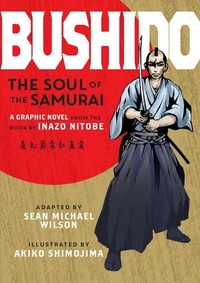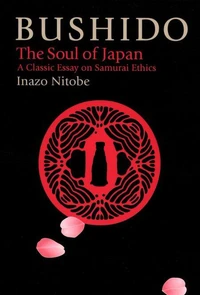Bushido. The Spirit of the Samurai
Par :Formats :
Disponible dans votre compte client Decitre ou Furet du Nord dès validation de votre commande. Le format ePub protégé est :
- Compatible avec une lecture sur My Vivlio (smartphone, tablette, ordinateur)
- Compatible avec une lecture sur liseuses Vivlio
- Pour les liseuses autres que Vivlio, vous devez utiliser le logiciel Adobe Digital Edition. Non compatible avec la lecture sur les liseuses Kindle, Remarkable et Sony
- Non compatible avec un achat hors France métropolitaine
 , qui est-ce ?
, qui est-ce ?Notre partenaire de plateforme de lecture numérique où vous retrouverez l'ensemble de vos ebooks gratuitement
Pour en savoir plus sur nos ebooks, consultez notre aide en ligne ici
- Nombre de pages176
- FormatePub
- ISBN0-8348-2355-1
- EAN9780834823556
- Date de parution11/10/2005
- Protection num.Adobe DRM
- Taille865 Ko
- Infos supplémentairesepub
- ÉditeurShambhala
Résumé
There are eight virtues of Bushido, the code of the samurai: justice, courage, benevolence, politeness, sincerity, honor, loyalty, and self-control. These virtues comprise the essence of Japanese cultural beliefs, which are still present today. Inazo Nitobe, one of Japan's most respected scholars, explores the ethical code of the samurai and contextualizes it within Japan's traditions of Buddhism, Shintoism, and Confucianism.
He then compares and contrasts Eastern values with those present in Western societies. Written in English and first published in 1905, this classic introduction to Japan's samurai culture has been a best-seller for decades. Focus on Asian Studies says it is "a must for an understanding of the soul of Japan."
He then compares and contrasts Eastern values with those present in Western societies. Written in English and first published in 1905, this classic introduction to Japan's samurai culture has been a best-seller for decades. Focus on Asian Studies says it is "a must for an understanding of the soul of Japan."
There are eight virtues of Bushido, the code of the samurai: justice, courage, benevolence, politeness, sincerity, honor, loyalty, and self-control. These virtues comprise the essence of Japanese cultural beliefs, which are still present today. Inazo Nitobe, one of Japan's most respected scholars, explores the ethical code of the samurai and contextualizes it within Japan's traditions of Buddhism, Shintoism, and Confucianism.
He then compares and contrasts Eastern values with those present in Western societies. Written in English and first published in 1905, this classic introduction to Japan's samurai culture has been a best-seller for decades. Focus on Asian Studies says it is "a must for an understanding of the soul of Japan."
He then compares and contrasts Eastern values with those present in Western societies. Written in English and first published in 1905, this classic introduction to Japan's samurai culture has been a best-seller for decades. Focus on Asian Studies says it is "a must for an understanding of the soul of Japan."




















